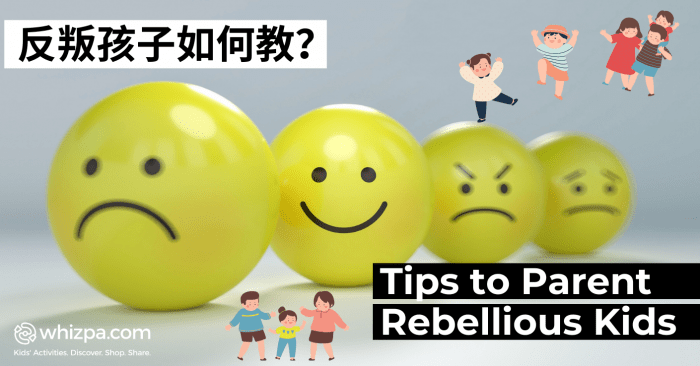
Tips to Parent Rebellious Kids
As parents, most of us have experienced occasional bouts of defiance from our kids. Be it when the child is in the toddler stage and is not quite comfortable with expressing himself in words, or when the child is in the notorious pre-teen/teen stage. When we witness defiance and rebellious attitudes in our kids, we either start to question ourselves as parents or keep wondering why parenting is so hard.
Fret not, we have found 5 key strategies that can help you keep your brood calm and sail through your kids’ maddening moments. Let’s take a look:
1. Model the Right Behaviour
While it is extremely hard, it is crucial to not lose your cool when dealing with a defiant child. You are the grown-up in the relationship and you are modelling to your kid how to act appropriately in a difficult / heated situation. Our kids may not have the knowledge of or access to all the resources needed to rescue themselves out of a difficult situation and they look up to us to help them navigate through difficult territory. This is a teachable moment where we can help them understand how to respond while experiencing a meltdown. If the kid is a bit older, you can softly say things like “We don’t yell. Please stop.” You can also consider teaching your kids some effective calming techniques. Educate her how to calm herself down when she is agitated by using a glitter jar. Just need to fill up 3/4th of a mason jar with water and then add clear glue and glitter and shake. Here’s what you can say to them, “You can shake this jar when you are upset and think of all the glitter as your anger/troubled thoughts and wait for it to settle at the bottom of the jar. As you witness this, your minds shall become calmer as well.” Train them to go to this jar and sit with it for a while, every time they seem upset. You can even train them how to work with belly breathing exercises.
2. Lay Down the Expectations and the Consequences
It is imperative that you educate your kids about the family rules clearly. You can’t hold them responsible for something they don’t know. Some families put up a chart or a paper board outlining the rules and their respective consequences to keep their kids’ behaviour in check. The rules need to be age appropriate though. You can’t expect a 5 year old to know how to keep his room sparkling clean. Rules for a younger child may look like this- “All toys need to be picked up from the floor and moved to the toy rack before bedtime.” It will differ for a teenager who’d be expected to keep everything in its place in his room. Also, if being rude to any family member or friend is an absolute no-no in your house, for instance, make sure your kids are aware of the consequences of flouting this rule (let’s say, no TV for the day). Do not compromise or give second chances. If you don’t enforce the consequences, the child will not take the rules seriously in future. It is equally important to think of consequences you are willing to enforce as a parent; it should not be unjustifiably harsh on the child.
3. Accept that You Can’t Control Everything
Parenting is as it is hard, so don’t try to control every aspect of your kids’ lives. Choose your battles wisely. Yes, your girl might have different fashion choices than you. She may want to dress up in an overly formal dress for a causal birthday party, or paint her nails black, or your boy may want to take a shower only in the afternoons or get a temporary tattoo. Don’t sweat the small stuff, lest the kids start thinking you are the perpetual critical parent. Instead, save your energy for the bigger things such as saying no to hanging out with friends who smoke, or saying no to partying beyond the curfew time.
4. Do Not Underestimate the Importance of Positive Reinforcement
Positive reinforcement helps instil good values and behaviours in children. Dr. Heather Maguire, a behaviour analyst and a school psychologist, advocates rewarding good behaviour. When your child does something nice, make sure you let him or her know. You could say things like “I appreciate you helping me with the dishes today”, “Thank you for helping your little brother with his homework.” You could put a note in their lunchbox thanking them for the way they tackled an argument with a family member, or you could buy her a copy of the fashion magazine she has been eyeing to show your appreciation. Realising that good deeds are often rewarded, the kids would want to keep doing more of it.
5. Identify the Root of Troublesome Behaviour
It helps to document your child’s rebellious episodes. Try to see if there is a hidden trigger somewhere that you might have earlier ignored. Sometimes, kids get cranky when they feel overwhelmed / have too much on their plate. Your teen may be refusing to start the homework because she does not understand the assignment and is too embarrassed to ask for help from her classmates. It could just well be that your kid cannot instantly move from one project to another and needs some extra transition time to function well. Figure out that trigger and then address it well. Further, it helps to focus on fixing one behaviour at a time. For example, if your teen is a) using abusive words towards family and friends, b) not studying for the exams, c) lazing around watching TV, you need to decide which behaviours you can live with and with ones are detrimental to the family’s safety. Enforce consequences for one behaviour at a time, try to bring it under control and then move to next bothersome behaviour.
It is interesting to note that children with strong rebellious personalities are tough to parent but ironically, these are the kind of kids who can grow up and bring some change to the world around them. Children who might be stubborn and defiant may, for instance, refuse to accept any kind of injustice at the workplace. Such traits are necessary for a person who wants to make society a better place. So yes, by all means manage the rebellious streak of your kids using firm and loving boundaries, but don’t squash their voice and their will to exert their opinions and viewpoints. All children undergo varying degree of defiance some time or the other. If, however, the rebellious episodes are too many and too close together, or there are warning signs such as loss of appetite, troubled sleep, falling grades, then it is advisable to seek professional counsel.








